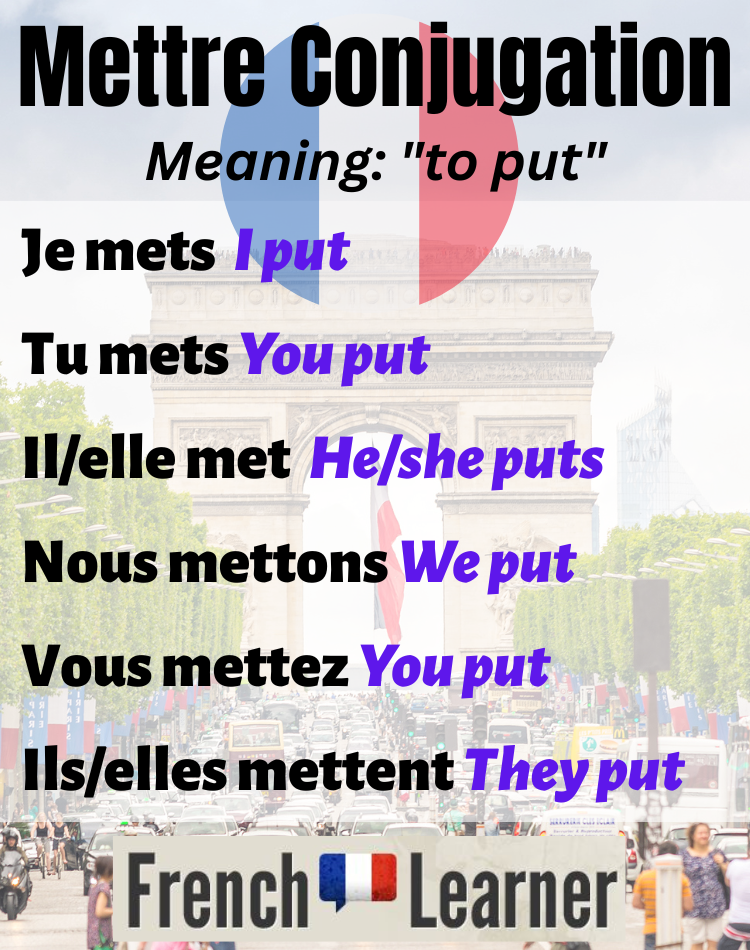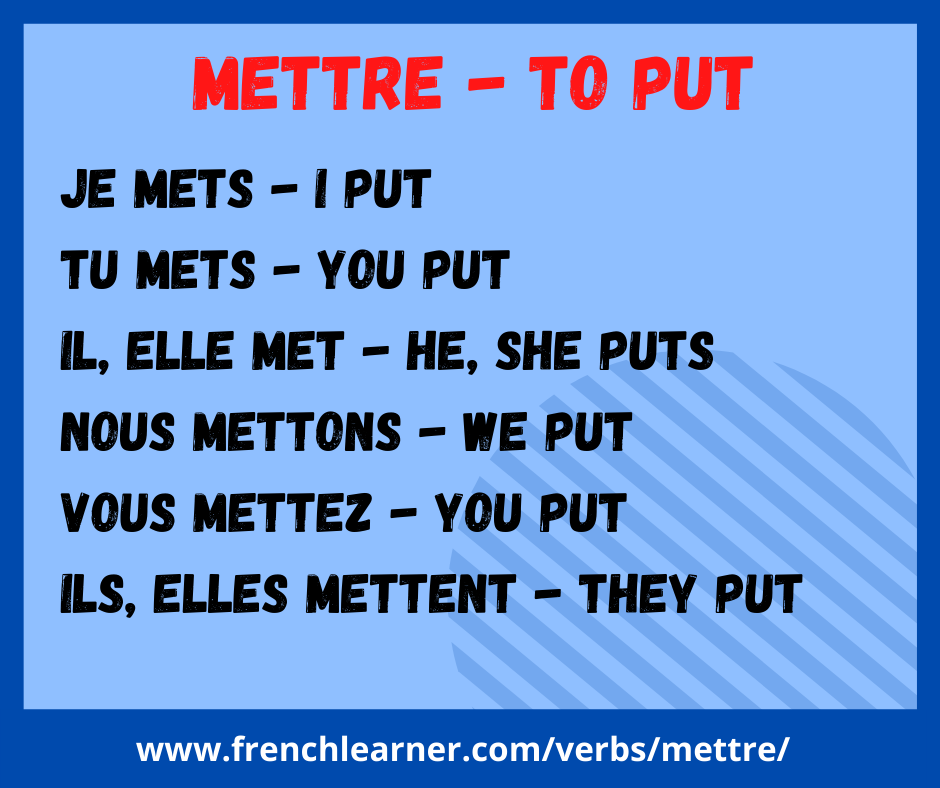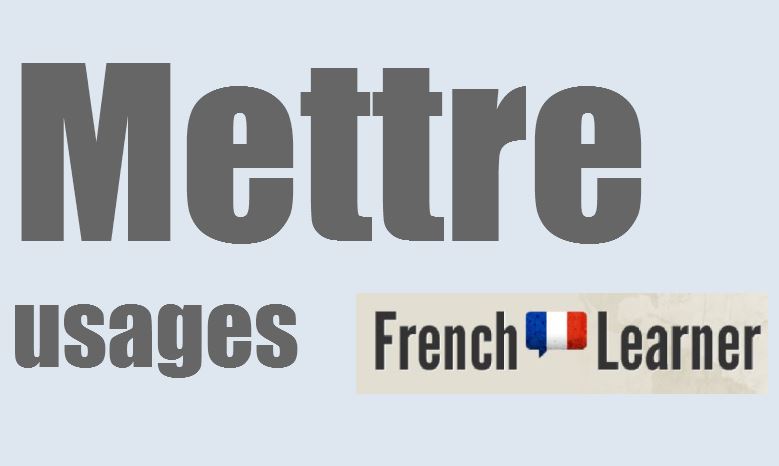The conjugation of mettre (Meaning: to put, to wear in French) in the present tense is: Je mets (I put), tu mets (you put), il/elle met (he/she puts), nous mettons (we put), vous mettez (you put) and ils/elles mettent (they put).

Mettre is an irregular -re verb. That means that its endings are different from other regular-re verbs when conjugated in the present tense.
In addition to mettre, French has another verb for to wear: porter.
The past participle of mettre is mis (put, wore) and the present participle is mettant (putting, wearing).
Further down the page we’ve provided conjugation charts for mettre in the following six major verb tenses:
- Present (le présent de l’indicatif)
- Compound past (le passé composé)
- Imperfect (l’imparfait)
- Simple future (le futur simple)
- Conditional (le présent du conditionnel)
- Present subjunctive (le subjonctif)
Mettre conjugation table
The following table gives a quick snapshot of how to conjugation mettre. We’ve included charts with example sentences further down the page.

Uses of mettre
The verb mettre is highly versatile and had many common usages in French.
To put, to place
The most common usage of mettre is to put and to place. For example:
- Sylvie met les fleurs sur la table. Sylvie puts (or places) the flowers on the table.
To put on
Another common usage of mettre is to put on. For example:
- Julie met ses lunettes. Julie puts on her glasses.
To turn on
The verb mettre can also mean “to turn on”, as in the TV or radio. For example:
- Jacques met la télé. Jacques turns on the TV.
Mettre can also be used for turning up or down the volume. For example:
- Mets le volume un peu plus fort, s’il vous plaît. Turn (or put) the volume up a bit, please.
To take (amount of time)
Mettre means “to take” in the context of how much time it takes to carry out an action.
- Jean met une heure pour arriver au bureau. Jean takes an hour to arrive at the office.
Se mettre à + infintive = to start, begin
In the form of a reflexive verb, se mettre à + infinitive means to start or begin to do an action. For example:
- Je me mets à travailler. I start working.
- Il se met à pleuvoir. It starts raining.
Mettre conjugation charts
In the following section we’ve included more elaborate conjugation charts for mettre. Our sample sentences make use of the the verbs various meanings including to put, to place, to wear and to put on.
Present tense (le présent)
In the present tense (le présent), je mets translates to “I put” and “I am putting”.
| Je mets | I put | Je mis du beurre sur le pain. | I put butter on the bread. |
| Tu mets | You put (familiar, singular) | Tu mets du maquillage avant de sortir de la maison. | You put on make-up before going out of the home. |
| Il/elle met | He/she puts | Elle met une heure pour arrive à Paris. | She takes an hour to get to Paris. |
| Nous mettons | We put | Nous mettons les assiette sur la table. | We put the plates on the table. |
| Vous mettez | You put (formal, plural) | Vous mettez vos meilleurs bijoux. | You put on your best jewelry. |
| Ils/elles mettent | They put, wear | Ils mettent la télé avant de dîner. | They turn on the TV before having dinner. |
In the following video, online teacher Alexa teaches the pronunciation of mettre when conjugated in teh present tense, passé composé and future tenses.
Compound past (passé composé)
The French use the passé composé to express pass actions which occurred a specific times. Mettre uses avoir (to have) as an auxiliary verb. J’ai mis means “I put”.
| J'ai mis | I put | J'ai mis la musique avant d'aller au lit. | I put the music on before going to sleep. |
| Tu as mis | You put (familiar, singular) | Tu as mis tes boucles d'oreille avant de sortir. | You put on your earrings before going out. |
| Il/elle a mit | He/she put | Elle a mis de la sauce de tomate sur la pizza. | She put tomato sauce on the pizza. |
| Nous avons mis | We put | Nous avons mis la chaîne 4 pour regarder le match de foot. | We put on channel 4 to watch the soccer game. |
| Vous avez mis | You put (formal, plural) | Vous avez mis cinq heures pour arriver à Munich. | You took five hours to get to Munich. |
| Ils/elles ont mis | They put | Ils ont mis la argenterie sur les tables. | They put the silverware on the tables. |
Imperfect (l’imparfait)
The French use the imperfect tense (l’imparfait) to express past events which occurred at unspecified times. Je mettais translates to “I was putting” and “I used to put”.
| Je mettais | I was putting, used to put | Je mettais des lunettes quand j'étais un enfant. | I used to wear glasses when I was a child. |
| Tu mettais | You were putting, used to put (informal, singular) | Tu mettais la table tout le temps quand tu habitais ici. | You used to set the table all the time when you lived here. |
| Il/elle mettait | He/she was putting, used to put | Elle mettait son maquillage quand le téléphone a sonné. | She was putting on her make-up when the phone rang. |
| Nous mettions | We were putting, used to put | Avant nous mettions la télé pendant tous nos repas. | Before we used to turn on the TV during all our meals. |
| Vous mettiez | You were putting, used to put (formal, plural) | Vous mettiez la musique trop fort quand vous étiez un adolescent. | You used to put the music on too loud when you were a teenager. |
| Ils/elles mettaient | They were putting, used to put | Ils mettaient trois heures pour arriver à Paris avant l'ouverture de la nouvelle route. | They used to take three hours to get to Paris before the opening of the new road. |
Future tense (le futur simple)
In the future tense (le future simple), je mettrai translates to “I will put”.
| Je mettrai | I will put | Je mettrai les verres sur la table. | I'll put the glasses on the table. |
| Tu mettras | You will put (informal, singular) | Tu mettras du maquillage ce soir. | You'll put on make-up tonight. |
| Il/elle mettra | He/she will put | Elle mettra la radio avant de commencer à travailler. | She'll turn on the radio before starting work. |
| Nous mettrons | We will put | Nous mettrons la table pour les invités. | We'll set the table for the guests. |
| Vous mettrez | You will put (formal, plural) | Vous mettrez les anchois sur la pizza. | You will put anchovies on the pizza. |
| Ils/elles mettront | They will put | Ils mettront les documents sur table. | They'll put the documents on the table. |
Conditional tense (le conditionnel)
The French use the conditional tense (le conditionnel) to describe hypothetical or “would” actions. Je mettrais translates to “I would put”.
| Je mettrais | I would put | Je mettrais un short s'il faisait plus chaud. | I would put on shorts if it were warmer out. |
| Tu mettrais | You would put (informal, singular) | Tu mettrais un costume si tu assistais au mariage. | You would put on a suit if you were attending the marriage. |
| Il/elle mettrait | He/she would put | Elle mettrait du maquillage mais ce n'est pas necessaire. | She would put on make-up bit it's not necessary. |
| Nous mettrions | We would put | Normalement, nous mettrions une heure pour arriver à Paris. | Normally we would take an hour to get to Paris. |
| Vous mettriez | You would put (formal, plural) | Vous mettriez la musique si les enfants n'etaient pas déjà au lit. | You'd put on some music if the kids weren't already in bed. |
| Ils/elles mettraient | They would put | Ils mettraient leurs anoraks s'il neigait. | They would put on their winter coats if it were snowing out. |
Subjunctive mood (le subjonctif)
The French use the subjunctive mood (le subjonctif) to express wishes, emotions and doubts. Que je mette translates to “that I put”.
| que je mette | that I put | Il faut que je mette mes lunettes. | I need to put on my glasses. |
| que tu mettes | that you put (familiar, singular) | Elle veut que tu mettes du maquillage. | She wants you to put on some make-up. |
| que il/elle mette | that he/she puts | Je doute qu'il mette la table. | I doubt he's setting the table. |
| que nous mettions | that we put | Il faut que nous mettions la télé. | We need to turn on the TV. |
| que vous mettiez | that you put (formal, plural) | Je veux que vous mettiez les documents sur le table. | I want you to put the documents on the table. |
| qu'ils/elles mettent | that they put | Je veux qu'ils mettent la musique un plus fort. | I want them to put the music a bit louder |



